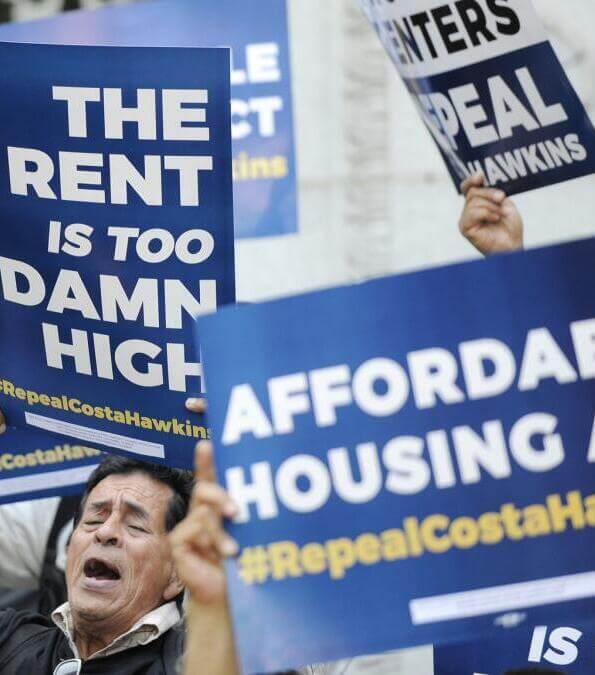What rental housing providers need to do in response to Michael Weinstein 3.0

Efforts to axe Costa-Hawkins have thus far been unsuccessful, but this time around, it has more than a fighting chance.
You’ve probably heard by now that Michael Weinstein, the sharp-elbowed president of the AIDS Healthcare Foundation, has reinvigorated attempts to repeal Costa-Hawkins, the decades-old law that exempts certain properties from rent control and allows landlords to set rent prices to whatever the market will bear once the unit is vacant. The battle lines have been drawn for and against the so-called “Renters for Justice Act.” Some background is in order.
In the year that Costa-Hawkins was passed, California’s government was a blend of lawmakers of various political persuasions, with many moderates having a voice in shaping public policy. Costa-Hawkins would never pass in today’s day and age when most Californians are renters and lawmakers have to appeal to them to advance their political careers.
Weinstein and his organization, AHF. amassed hundreds of thousands of signatures in short order and easily surpassed the number needed to qualify for the November ballot. As told by Politico, the polarizing nonprofit honcho paid out $2 for every signature to support the ballot initiative. Asking someone, “Is the rent too high?,” obtaining their signature, and paying them $2 was easy enough to do.

Previous measures that would have tampered with Costa-Hawkins handily have failed. What’s different this time around? Rent-burdened voters attempting to cope with unaffordability.
In years gone by, the failed Props 10 and 21 would have made specific modifications to the longstanding law, but the goals were not to repeal it altogether. Without the safeguards of Costa-Hawkins, cities already operating under rent control will reel back to a time of strict rent control, when there was a considerable amount of housing stock lost as owners took rentals off the market.
Another consequence going hand in hand with harsh rent control policies pre-Costa-Hawkins was deferred maintenance. There were no financial incentives for landlords to maintain their buildings, much less improve and beautify their properties.
Although Props 10 and 21 were voted down in years past, we are concerned voters struggling to make ends meet with rising costs. As we observed in an earlier article, stronger renter protections are now more palpable in corners of suburbia that were once removed from the activism we only expected to see in progressive cities.
When we first began our legal careers 26 years ago, we had to contend with three rent ordinances, namely San Francisco, Oakland, and Berkeley, but greater tenant protections have since expanded well outside these urban centers. Calls for rent control continue to proliferate, with Larkspur, Pittsburg, San Pablo, Redwood City, and Concord but a handful of locales with more rent and eviction controls are being incubated.
Rallying up the troops.
The California Housing Association, California Rental Housing Association and its affiliates, and the California Business Roundtable are all strapped in for an epic fight and, fortunately, there are brilliant political strategists behind the campaign to defeat the ballot measure.
Unfortunately, it is going to be an arduous battle requiring tens of millions of dollars. We were alarmed to see early poll results. Even if respondents were not rent-burdened, they know someone who has a financial hardship, and so a staggering number of people polled were in favor of rent control. We don’t want to reveal exact numbers and alert those on the competing side.
Interestingly, however, the numbers shrink when the question is framed differently. When asked if they conceptually support the idea of local governments having more authority to impose increased regulations on housing providers, far fewer respondents were behind it. Our takeaway is that the messaging has to be nailed, and this will be a war of words.

Weinstein’s most compelling argument?
What resonates with likely voters is that billion-dollar corporations outside of California are gobbling up housing stock and raising the rents to unaffordable levels to make more profit.
What is the greatest messaging to provide a counternarrative? That is being planned and fine-tuned through research, focus groups, etc., but clearly, it should be articulated that the repeal of Costa-Hawkins would hurt smaller “mom and pop” landlords.
Another interesting argument we haven’t heard of: it will drive more Californians out of the state. Governor Gavin Newsom has touted an anticipated taking the state’s budget deficit to a budget surplus because of increased revenue. Translation: more taxes. While it can be debated who is paying their fair share of taxes, what is not up for debate is that Californians who leave the state won’t pay their fair share of taxes; they won’t be paying taxes at all.
Republicans need to be galvanized to vote in full force.
In a state that is solidly blue, Republicans do not influence the Presidential race, but they can make an impact in thwarting Weinstein’s efforts. Republicans represent the smallest voting bloc, but overwhelmingly they are allies of rental housing providers in opposing the Renters with Justice Act.
Many militant Democrats and tenants’ activists will not budge on their vote, which leaves more moderate, sober-minded Democrats and independents who are open to hearing out the concerns of landlords. The political operatives conducting the polls have articulated a pathway to defeating the measure, but after the numbers are crunched, victory would come with a razor-thin margin.
What can housing providers do?
In our view, our industry partners have done a good job of educating the rental housing community about the campaign that’s underway to strip landlords of their rights, but this is not enough.
Of course, housing providers will vote NO for the ballot measure come November. They are a friendly audience. We need to talk to people less informed. In a grassroots effort, we need to win over the hearts and minds of voters who are undecided or do not recognize the detriment to renters if Costa-Hawkins is repealed.
In the coming weeks as the gears start meshing, we’ll share updated materials and verbiage to use when corresponding with family, friends, neighbors, and influencers.
What would go a long way in dispelling Weinstein’s portal of housing providers being “greed-fueled speculators” are accounts, preferably through video, of the hardships faced by small landlords. We want to convey that small landlords care deeply about the communities they live in and are the greatest engine of clean, safe, and affordable housing. Large corporations and REITS do not have a friendly faces but mom and pops do.
Finally, consider donating to the cause. It’s going to take vast resources to stop this measure, including a lot of airtime and social media involvement. For those of you who say November is far-flung in the future, keep in mind that substantial savings can be realized when media buys are made early. Some “early bird” savings can be up to 50%.
Also remember that in a Presidential race year and with other hotly contested seats and ballot measures up for voters to decide on, political ads will be plastered everywhere in the weeks leading up to November and the price will go up. Better to lock in lower rates early on than to wait for a crowded field to drive up the costs of getting our message out.
